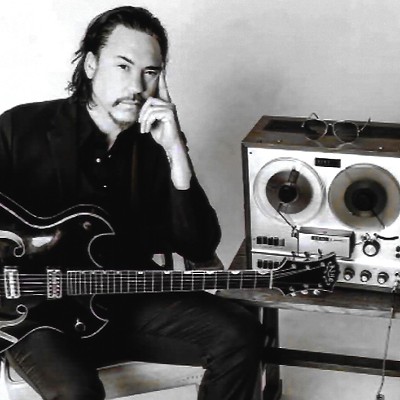During his musical life, Wagoner, born August 12, 1927 in the small Ozark Mountains community of West Plains, Missouri, was a singer, songwriter, bandleader, arranger, producer and television personality. His contributions to country music are “manifold and consequential,” writes Peter Cooper in today’s Nashville Tennessean obituary. Wagoner’s All Music Guide biography calls him “an artist often ahead of his time who has always appeared hopelessly behind the times.”
His signature songs include “A Satisfied Mind” and “The Green, Green Grass of Home,” as well as Dolly Parton duets “Just Someone I Used to Know” and “Making Plans.” Wagoner’s comeback album, Wagonmaster (Anti-), released in June and produced by friend and fellow Opry stalwart Marty Stuart, is far and away one of 2007’s best-reviewed country records.
After helping his family hold onto their farm in the Great Depression and learning guitar from his older brother Glenn Lee, Wagoner became a singing star, first in West Plains and then in Springfield on Red Foley’s popular Ozark Jamboree program, which won him a contract with RCA Records. His first real brush with success came in 1953 when Carl Smith (June Carter Cash’s first husband) took Wagoner’s “Trademark” to No. 2; Wagoner’s first Top 10 hit, “Company’s Comin’,” followed the next year, and “Satisfied Mind” topped the country charts in 1955.
In 1961, Wagoner began hosting his eponymous television show, which ran for two decades and expanded from Nashville’s local airwaves to over 100 stations in syndication at its peak, bringing country music and Southern gospel to regions of the country where it had been rarely heard (and even more seldom seen) before. “We had evolved from bluegrass and old-timey bands, but what we didn’t know was country & western,” Grateful Dead lyricist Robert Hunter told the Tennessean. “So a little bit of Nashville moved into the Bay Area, and it was like nothing I’d ever seen.”
When original female vocalist Norma Jean left the show in 1967, Wagoner hired Pigeon Forge, Tennessee, native Dolly Parton as her replacement, a move that set her on the road to superstardom. The duo went on to record 14 Top 10 singles and win a Grammy and three Country Music Association awards for Duo of the Year, but Wagoner’s solo efforts never charted quite as well as their duets, and he and Parton split less than amicably in 1974. She wrote her megahit “I Will Always Love You” about their breakup, and they eventually reconciled years later.
Wagoner was never afraid to experiment within the sometimes rigid stylistic structure of country music. He recorded some of the genre’s first concept albums in What Ain’t to Be Just Might Happen and The Cold, Hard Facts of Life, and notched an underground novelty hit in the early ‘70s with his bizarre foray into reverb-heavy psychedelia, “Rubber Room”; he once told Hunter he was as big a fan of the Dead as they were of him.
After Wagoner’s TV show left the air in 1981, country-music theme park Opryland named him an official “Goodwill Ambassador” and he began appearing regularly on cable’s The Nashville Network, which eventually led to his taking over as Opry host and (with Little Jimmy Dickens) leading personality upon Minnie Pearl’s 1996 death. He retired from full-time recording in 1983, touring for several years with all-girl band the Right Combination, before re-emerging with 2000’s The Best I’ve Ever Been.
Wagoner suffered an aneurysm last year, but recovered and recorded Wagonmaster with Stuart. And old-school, hard-country tour de force, its highlights include the lively “Be a Little Quieter” and “Buck and the Boys” (a tribute to his longtime band, the Wagonmasters), irreverent “Hotwired,” nostalgic “Eleven Cent Cotton,” religious “Satan’s River” and the chilling “Committed to Parkview,” an account of a stay in a Nashville mental hospital written but never recorded by Stuart’s father-in-law Johnny Cash.
Before he took ill, Wagoner opened for longtime fans the White Stripes this summer at Madison Square Garden. He is survived by children Richard, Debra and Denise. – Chris Gray






